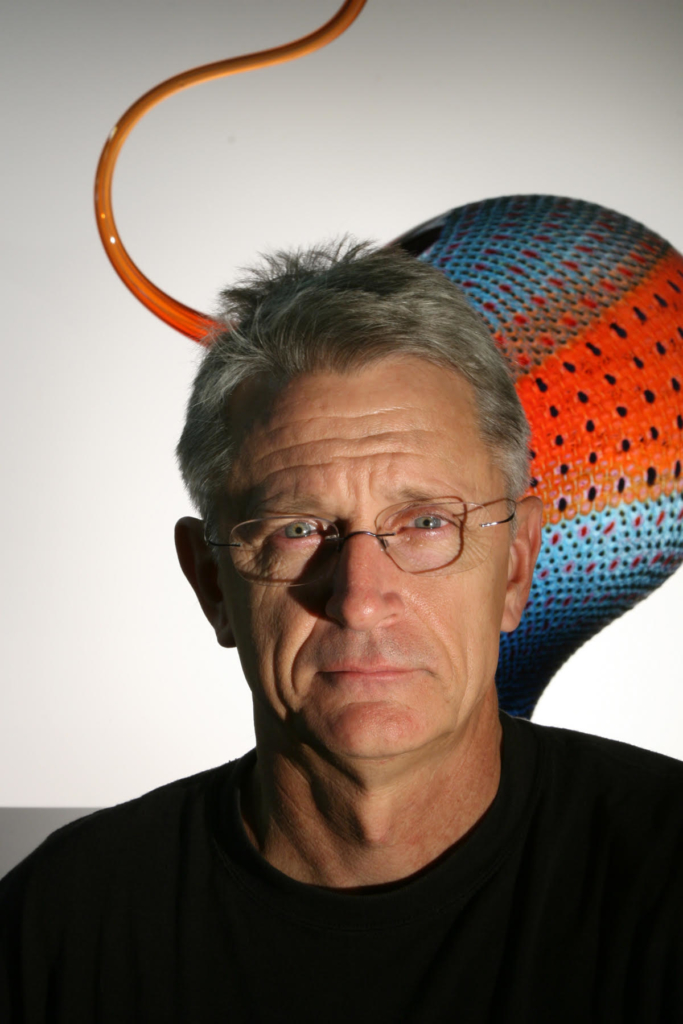Great artists gravitate to great cities to practice their craft and seek fame and fortune. In the 60s, New York was the magnet for Rothko, Jackson Pollock, Andy Warhol, and a whole bevy of other abstract expressionist painters. Earlier, any artist with an interest in film flocked to L.A. After WWI, the most talented writers knew they had to be in Paris or London.
Only occasionally have truly world-class artists chosen to make their homes in small-town America. But when they do, the result can be transformative for both the artist and the town.
Stephen Rolfe Powell, a preeminent international glass artist, chose Danville, Kentucky (population 16,000) for his home and studio, teaching and blowing glass at Centre College for 34 years. When Powell died at the age of 67 on March 16, 2019, he was recognized as one of the best glass artists in the world.
Art critic James Yood of the School of the Art Institute in Chicago had described Powell as “the finest color-field painter in contemporary art.” Powell’s stunning 3’ high glass vessels shimmering with colorful Venetian murrine were displayed in St. Petersburg’s Hermitage, Italy, Japan, New Zealand, and elsewhere around the world. The Smithsonian Museum has recently acquired one of his pieces for its permanent collection.
This fall, Powell’s life and work will be celebrated with a retrospective exhibit titled “The Power of Color,” running August 26-October 29 at the Art Center of the Bluegrass in Danville. The exhibit features pieces from Stephen’s personal collection and is curated by Brook Forrest White, Jr., a protege, former student, and close friend of Stephen’s.
The exhibit is timed to coincide with dedication of the “Stephen R. Powell Memorial Garden and Outdoor Classroom” on the Centre College campus, a project which is also being overseen by Brook Forrest White, Jr. The memorial garden will feature a 25-foot-tall sculpture that spectators can walk through, as well as a garden, a walking path, three custom-made artistic benches, and a small amphitheater that will serve as an outdoor classroom.

(Stephen Rolfe Powell)
During his three decades in Danville, Powell’s impact on the community was profound. He founded a hot glass program at Centre College that became a major draw for the institution and the town. His eagerness to share his passion for glass led him to host community events at his studio, inviting the public to enjoy a front-row view of his creativity. That accessibility, coupled with Powell’s tremendous talent, led to strong community support for Powell as an artist, with numerous local collectors taking great pride in the acquisition of his pieces.
In 2003, he helped found a community art center in Danville, an organization which has since grown to become a regional artistic hub as the Art Center of the Bluegrass. With a mission to connect people, art, culture, and creativity, the Art Center plays an important role in increasing arts access in Central Kentucky. The organization hosts rotating exhibits of regional, national, and international artwork, offers a wide range of hands-on classes and workshops, and partners with community entities to bring arts opportunities to the region. The Art Center is also one of three locations in Danville where Powell’s artwork can be seen on permanent public display.
In giving so much to his community, Powell was in turn shaped by the support of his chosen hometown. He was continuously curious about the different perspectives of his close friends at Centre who taught music, anthropology, world religions, philosophy, and literature. His constant interaction with them broadened his own understanding of the world and influenced the evolution of his work.
The retrospective exhibit and memorial garden form a fitting tribute to a unique relationship – a thirty-year love affair between larger-than-life artist and the community that embraced him.
What Retrospective at Art Center of the Bluegrass
Where: 401 West Main Street, Danville, Kentucky
When: August 26–October 29. Tuesday–Friday, 11 a.m.–7 p.m. and Saturday, 10 a.m.–5 p.m.

